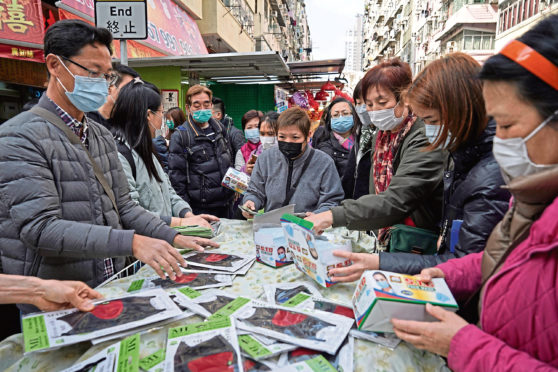My wife suggested it might be a sensible precaution to pack anti-coronavirus face masks for our journey to the Far East, so I was despatched to buy them.
Left to my own devices, I went to B&Q.
This didn’t go down very well as she meant medical masks of the type you might buy from Boots and other reputable suppliers of pharmaceutical products.
I’ve not been thrust into the path of a potential pandemic before, so I blame nerves.
Normally, I buy industrial masks for sweeping the garage floor or applying a strange blue substance to our garden fencing, which makes years of accumulated green mould disappear instantly.
My wife got it online from somewhere abroad and I’ve often wondered what would happen if I ever breathed it in by accident.
I have enough trouble with avoidable household accidents without having to worry about coronavirus, too. They have put me in hospital twice in recent times.
I fell out of a large conifer on one occasion and on another I fell out of my pyjamas, snapping a finger tendon.
We are terrified about a new deadly plague for which we are unprepared, but rarely give a second thought to self-inflicted mayhem in our homes.
By the way, why does the sound of this nasty illness rekindle warm childhood memories?
That’s it – the word “corona”. I used to guzzle lashings of Corona-brand fizzy drinks as a child.
In the ’70s Corona’s slogan was: “Every bubble has passed its fizzical!” Now airborne bubbles in some places can give you coronavirus.
Around the time you read this, I will be flying into the eye of the coronavirus storm and preparing to come home none the worse for the experience – hopefully.
The Gulf of Thailand – our destination – is 1,700 miles from Wuhan in China, where the virus appears to have sprung out of a seafood market and invaded humans like an alien bacterium.
So it’s not really the eye of the storm, I suppose, but it appears to be on the doorstep of China when you stare at a map. It’s still in the Far East region, whichever way you look at it.
It’s only natural to be alarmed by a new invisible threat. That is why we don’t want to look out of place when we are sitting in Singapore awaiting our flight connection and realise we are the only people without masks.
A sales assistant at Boots in Aberdeen told us apologetically they had been cleaned out of their stock of masks and hinted it was a plague of panic buying.
I doubt if many of these buyers were in imminent danger. In all probability, the masks are gathering dust and other particles on their shelves at home. Whatever next? Baked beans vanishing from supermarkets and petrol shortages?
I noticed the web was teeming with cheap flight offers from Wuhan to our holiday resort, which was a bit worrying. The Chinese are Thailand’s biggest tourist customers, or maybe I should now say “were”.
But we must keep a sense of perspective over all this alarmism.
We have weathered pandemic threats in the recent past, notably bird flu and Sars. And the horrific world flu plague a century ago was at a time when medical science and nursing practices were not up to it.
As with all these outbreaks coronavirus seems to pick off the sick and vulnerable, such as very old and very young people, but varies in strength.
I heard two medical experts being interviewed – one from the World Health Organisation and another from a British university. One said coronavirus was less dangerous than Sars, while his colleague believed current mortality rates of 2% put it just above flu.
Annual flu deaths in Scotland are predictable and inevitable every winter – despite best efforts and immunisation campaigns by the NHS.
On a day recently when coronavirus started dominating headlines, it was revealed that we were still killing a worrying number of people with air pollution across Scotland and UK.
People don’t seem bat an eyelid over figures like these. This is not intended to play awful tragedies down or take them for granted without questioning the circumstances, but it is just about perspective.
Whichever way the outbreak will go is too early to predict but, like dogs on a leash straining every sinew, we sense doom-mongerers are itching to announce that coronavirus is the end of the world.
The race now for the world’s medical scientists is to get ahead of coronavirus and nullify it. Attention will again focus on how wildlife for human consumption is managed in public places around the world.
As I said earlier, we do a good job of injuring or killing ourselves in our homes already without any assistance from deadly viruses.
Official UK figures reveal that 6,000 deaths are caused every year by serious mishaps around the home.
We manage to poison 25,000 of our under-fives accidentally each year and about 4,000 children aged under 15 fall out of windows.
We asked our GP about our coronavirus travel fears. She advised us to exercise common sense, avoid crowded places where possible and practise good hand hygiene.
But, most of all, to stop worrying and simply enjoy ourselves. I like that type of medical advice.











